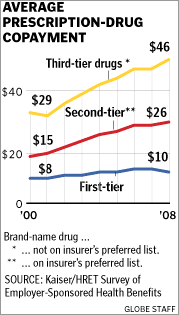According to government figures, 1-percenters' share of America's total income is the highest it has been since 1929, and their tax rates are the lowest they've faced in two decades. Through bonuses, many 1-percenters will profit from the $23 trillion in bailout largesse the Treasury Department now says could be headed to financial firms.
And, most of them benefit from IRS decisions to reduce millionaire audits and collect zero taxes from the majority of major corporations.
But what really makes the ultra-wealthy so fortunate, what truly separates this moment from a run-of-the-mill Gilded Age, is the unprecedented protection the 1-percenters have bought for themselves on the most pressing issues.
To review: With 22,000 Americans dying each year because they lack health insurance, Congress is considering universal health care legislation financed by a surcharge on income above $280,000 — that is, a levy almost exclusively on 1-percenters. This surtax would graze just 5 percent of small businesses and would recoup only part of the $700 billion the 1-percenters received from the Bush tax cuts.
In fact, it is so minuscule, those making $1 million annually would pay just $9,000 more in taxes every year — or nine-tenths of 1 percent of their 12-month haul.
Nonetheless, the 1-percenters have deployed an army to destroy the initiative before it makes progress.
The foot soldiers are the Land Rover Liberals. ...
Echoing that demand are the Corrupt Cowboys — those like Sen. Max Baucus, D-Mont., who come from the heartland's culturally conservative and economically impoverished locales. ...
That fantastical fairly tale, of course, couldn't exist without the Millionaire Media — the elite journalists and opinionmongers who represent corporate media conglomerates and/or are themselves extremely wealthy. Ignoring all the data about inequality, they legitimize the assertions of the 1-percenters' first two battalions, while actually claiming that America's fat cats are unfairly persecuted.
For example, Washington Post editors deride surtax proponents for allegedly believing "the rich alone can fund government." Likewise, Wall Street Journal correspondent Jonathan Weisman wonders why the surtax "soak(s) the rich" by unduly "lumping all of the problems of the finances of the United States on 1 percent of (its) households?"
And most brazenly, NBC's Meredith Vieira asks President Obama why the surtax is intent on "punishing the rich?"
For his part, Obama has responded with characteristic coolness — and a powerful counter-strike. "No, it's not punishing the rich," he said.
"If I can afford to do a little bit more so that a whole bunch of families out there have a little more security, when I already have security, that's part of being a community." ...
 ...
...